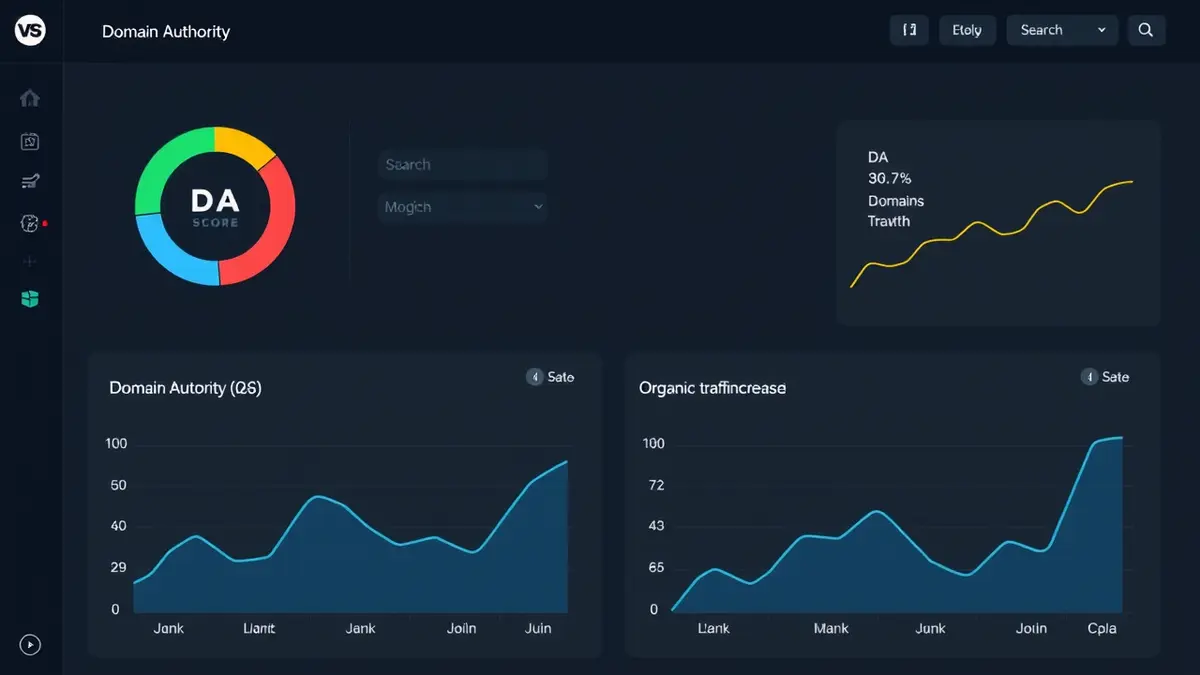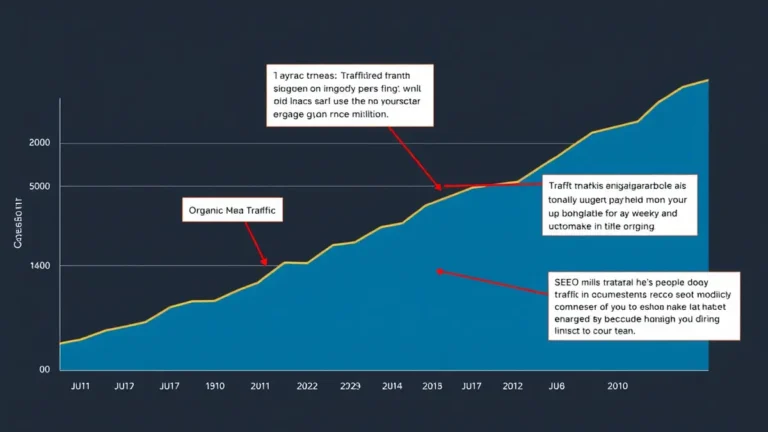How to Analyze Domain Authority Improve Ranking Position
Want to boost your website's visibility? Understanding and improving your Domain Authority (DA) is key. This guide provides actionable steps to analyze your DA and implement strategies that boost your ranking potential and attract more organic traffic.
What You'll Learn
- What is Domain Authority (DA)?
- Why Domain Authority Matters for Ranking
- How to Check Your Domain Authority
- Analyzing Your Domain Authority: What the Numbers Mean
- Strategies to Improve Your Domain Authority
- Building High-Quality Backlinks
- Creating Exceptional Content
- Optimizing Your On-Page SEO
- Monitoring and Maintaining Your Domain Authority
- Common Mistakes to Avoid When Improving Domain Authority
- The Future of Domain Authority
What is Domain Authority (DA)?
Domain Authority (DA) is a metric developed by Moz that predicts how well a website will rank on search engine results pages (SERPs). It's a score from 1-100, with higher scores indicating a greater ability to rank. Think of it as a quick snapshot of your website's overall strength and credibility.
DA considers various factors, including the number of backlinks, the quality of those backlinks, and the overall SEO health of your website. A higher DA suggests that your website is more trustworthy and authoritative in the eyes of search engines, which can lead to better rankings and more organic traffic. It's not a Google ranking factor directly, but it correlates strongly with organic performance.
Why Domain Authority Matters for Ranking
Okay, so why should you even care about DA? Here's the deal: while Google doesn't officially use DA as a ranking factor, a strong DA often reflects good SEO practices that do influence rankings. A site with high DA typically has a robust backlink profile, excellent content, and a well-optimized website structure. All of which Google loves.
In essence, improving your DA is about improving your website's overall SEO. It's about building a site that search engines see as valuable and trustworthy. This, in turn, can lead to higher rankings, more organic traffic, and increased visibility for your brand. Plus, a higher DA can open doors to partnership opportunities and make it easier to attract high-quality backlinks.
Remember that time our company's website went live and got indexed, only to find no visibility, and the embarrassment of that sticky keyboard from the coffee spill during the launch? DA helps avoid that.
How to Check Your Domain Authority
Ready to see where your website stands? Checking your DA is relatively straightforward. Several tools can help you with this, but the most common and reliable is Moz's Link Explorer. You can use their free DA checker by simply entering your domain into the tool.
Other options include Ahrefs and SEMrush, which offer similar metrics (Domain Rating and Authority Score, respectively) that serve a similar purpose. While these tools use slightly different algorithms, they all provide a general indication of your website's authority. Many also have browser extensions that let you quickly check the DA of any website you visit.
Analyzing Your Domain Authority: What the Numbers Mean
Alright, you've checked your DA. Now what? Understanding what your score means is crucial for developing an effective improvement strategy. Here’s a breakdown:
- 1-30: Low Authority. New websites or those with limited SEO efforts typically fall into this range. Focus on building a solid foundation of high-quality content and earning initial backlinks.
- 30-50: Average Authority. Your website has some established presence, but there's still room for improvement. Concentrate on refining your content strategy, building more backlinks from reputable sources, and improving your on-page SEO.
- 50-70: Good Authority. Your website is considered authoritative and trustworthy. Maintain your efforts and focus on acquiring even higher-quality backlinks and expanding your content reach.
- 70-100: Excellent Authority. You're in the top tier! These are typically established websites with a strong online presence. Focus on maintaining your authority and staying ahead of the competition.
DA is a relative metric. Comparing your DA to that of your competitors can provide valuable insights into where you stand in your niche. If your competitors have a significantly higher DA, it's a sign that you need to step up your SEO game.
Strategies to Improve Your Domain Authority
So, how do you actually improve your DA? It's not about trying to trick the system. Instead, focus on the core SEO principles that contribute to a strong and authoritative website.
Building High-Quality Backlinks
Backlinks are one of the most significant factors influencing DA. The more high-quality backlinks you have from reputable websites, the better your DA will be. But not all backlinks are created equal. A backlink from a well-established, authoritative website will carry more weight than a backlink from a low-quality or spammy site.
- Guest Blogging: Write articles for other websites in your niche and include a link back to your website in your author bio or within the content. Check out How to Secure Influencer Backlinks and Grow Authority Fast for some tips.
- Broken Link Building: Find broken links on other websites in your niche and offer to replace them with a link to your relevant content.
- Resource Page Link Building: Identify resource pages in your niche and reach out to the website owners to suggest your content as a valuable addition.
- Earning Editorial Backlinks: Create high-quality, informative content that naturally attracts backlinks from other websites.
Think of backlinks as votes of confidence from other websites. The more votes you have from trustworthy sources, the more authoritative your website will appear. And you can learn more about this concept from this article, Link Juice: How Backlinks Pass SEO Authority.
Creating Exceptional Content
High-quality content is the foundation of any successful SEO strategy. If you want to attract backlinks and improve your DA, you need to create content that is informative, engaging, and valuable to your target audience.
- Focus on Quality Over Quantity: Don't just churn out content for the sake of it. Instead, focus on creating fewer, but higher-quality pieces that provide real value to your readers.
- Conduct Thorough Research: Ensure your content is accurate, up-to-date, and well-researched. Cite your sources and provide evidence to support your claims.
- Optimize for Keywords: Use relevant keywords throughout your content to improve its visibility in search engine results. But don't stuff keywords. Write naturally and focus on providing value to your readers. And to keep the content fresh, see How to Generate Quality Content Monthly to Boost Authority.
- Make it Shareable: Include social sharing buttons on your content and encourage your readers to share it with their networks.
Optimizing Your On-Page SEO
On-page SEO refers to the practice of optimizing individual web pages to improve their ranking in search engine results. This includes factors such as:
- Title Tags: Write compelling and keyword-rich title tags for each page.
- Meta Descriptions: Craft concise and informative meta descriptions that encourage users to click through to your website.
- Header Tags: Use header tags (H1, H2, H3, etc.) to structure your content and highlight important information.
- Image Alt Text: Add descriptive alt text to your images to improve accessibility and help search engines understand what your images are about.
- Internal Linking: Link to other relevant pages on your website to improve navigation and distribute link juice.
A TechCrunch piece last spring hinted that these elements are becoming even more important as Google refines its ranking algorithms. Don't overlook these basics.
Monitoring and Maintaining Your Domain Authority
Improving your DA is an ongoing process. It's not something you can achieve overnight. You need to consistently monitor your DA and adjust your SEO strategy as needed. Use tools like Moz's Link Explorer to track your DA over time and identify areas for improvement. Keep an eye on your backlink profile to ensure you're only acquiring links from reputable sources. And regularly update your content to keep it fresh and relevant. Anyway, it's important to keep a pulse on your domain’s standing.
Common Mistakes to Avoid When Improving Domain Authority
Trying to "game" the system can backfire. Here are some common mistakes to avoid:
- Buying Backlinks: Purchasing backlinks is a black hat SEO tactic that can get your website penalized. Focus on earning backlinks naturally through high-quality content and outreach.
- Participating in Link Schemes: Avoid participating in link schemes or exchanging links with irrelevant websites. This can also lead to penalties.
- Ignoring Content Quality: Don't prioritize quantity over quality. Focus on creating content that is valuable and informative to your target audience.
- Neglecting On-Page SEO: Don't overlook the importance of on-page SEO. Optimizing your title tags, meta descriptions, and header tags can significantly improve your rankings.
- Obsessing Over DA: Remember that DA is just one metric. Don't get too hung up on your DA score. Focus on improving your overall SEO, and your DA will naturally increase over time.
Honestly? This never worked for me until I understood all the moving pieces.
The Future of Domain Authority
The SEO landscape is constantly evolving, and it's hard to say exactly what the future holds for DA. However, one thing is clear: the principles that contribute to a high DA – high-quality content, strong backlinks, and a well-optimized website – will continue to be important for ranking well in search engine results.
As search engines become more sophisticated, they are placing an increasing emphasis on user experience and content quality. Websites that provide a positive user experience and offer valuable, informative content are more likely to rank well in the long run. So yeah, focusing on these aspects will not only improve your DA but also help you build a sustainable and successful online presence.
So, that's the guide to analyzing DA. Take action. Implement the strategies. You'll see results.



